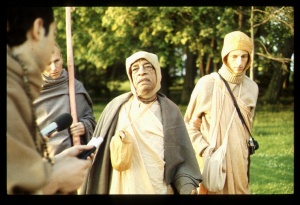CC Madhya 22.132 (1975): Difference between revisions
(Vanibot #0027: CCMirror - Mirror CC's 1996 edition to form a basis for 1975) |
(Vanibot #0020: VersionCompareLinker - added a link to the Version Compare feature) |
||
| Line 2: | Line 2: | ||
<div style="float:left">'''[[Sri Caitanya-caritamrta (1975)|Śrī Caitanya-caritāmṛta (1975)]] - [[CC Madhya (1975)|Madhya-līlā]] - [[CC Madhya 22 (1975)|Chapter 22: The Process of Devotional Service]]'''</div> | <div style="float:left">'''[[Sri Caitanya-caritamrta (1975)|Śrī Caitanya-caritāmṛta (1975)]] - [[CC Madhya (1975)|Madhya-līlā]] - [[CC Madhya 22 (1975)|Chapter 22: The Process of Devotional Service]]'''</div> | ||
<div style="float:right">[[File:Go-previous.png|link=CC Madhya 22.131 (1975)|Madhya-līlā 22.131]] '''[[CC Madhya 22.131 (1975)|Madhya-līlā 22.131]] - [[CC Madhya 22.133 (1975)|Madhya-līlā 22.133]]''' [[File:Go-next.png|link=CC Madhya 22.133 (1975)|Madhya-līlā 22.133]]</div> | <div style="float:right">[[File:Go-previous.png|link=CC Madhya 22.131 (1975)|Madhya-līlā 22.131]] '''[[CC Madhya 22.131 (1975)|Madhya-līlā 22.131]] - [[CC Madhya 22.133 (1975)|Madhya-līlā 22.133]]''' [[File:Go-next.png|link=CC Madhya 22.133 (1975)|Madhya-līlā 22.133]]</div> | ||
{{CompareVersions|CC|Madhya 22.132|CC 1975|CC 1996}} | |||
{{RandomImage}} | {{RandomImage}} | ||
==== TEXT 132 ==== | ==== TEXT 132 ==== | ||
| Line 25: | Line 24: | ||
<div class="translation"> | <div class="translation"> | ||
" 'One should congregationally chant the holy name of the Lord and reside in Vṛndāvana.' | |||
</div> | </div> | ||
| Line 32: | Line 31: | ||
<div class="purport"> | <div class="purport"> | ||
Navadvīpa-dhāma, Jagannātha Purī-dhāma and Vṛndāvana-dhāma are considered to be identical. If one goes to Mathurā-maṇḍala-bhūmi for sense gratification or to make a livelihood, he commits an offense and is condemned. Whoever does so must be penalized in the next life by becoming a hog or a monkey in Vṛndāvana-dhāma. After taking on such a body, the offender is liberated in the next life. Śrīla Bhaktisiddhānta Sarasvatī Ṭhākura remarks that residing in Vṛndāvana with a view to enjoy sense gratification surely leads a so-called devotee to a lower species. | |||
</div> | </div> | ||
Latest revision as of 14:12, 27 January 2020

A.C. Bhaktivedanta Swami Prabhupada
TEXT 132
- nāma-saṅkīrtanaṁ śrīman-
- mathurā-maṇḍale sthitiḥ
SYNONYMS
nāma-saṅkīrtanam—chanting the Hare Kṛṣṇa mahā-mantra; śrīman-mathurā-maṇḍale—in Mathurā, where Kṛṣṇa specifically performs His pastimes; sthitiḥ—residence.
TRANSLATION
" 'One should congregationally chant the holy name of the Lord and reside in Vṛndāvana.'
PURPORT
Navadvīpa-dhāma, Jagannātha Purī-dhāma and Vṛndāvana-dhāma are considered to be identical. If one goes to Mathurā-maṇḍala-bhūmi for sense gratification or to make a livelihood, he commits an offense and is condemned. Whoever does so must be penalized in the next life by becoming a hog or a monkey in Vṛndāvana-dhāma. After taking on such a body, the offender is liberated in the next life. Śrīla Bhaktisiddhānta Sarasvatī Ṭhākura remarks that residing in Vṛndāvana with a view to enjoy sense gratification surely leads a so-called devotee to a lower species.